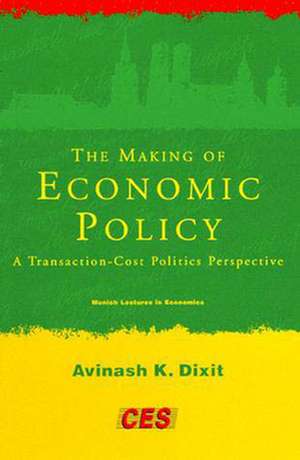The Making of Economic Policy – A Transaction Cost Politics Perspective
Autor Avinash K. Dixit, Hans–werner Sinnen Limba Engleză Paperback – oct 1998
Avinash Dixit looks for an improved understanding of the politics of economic policy-making from a transaction cost perspective. Such costs of planning, implementing, and monitoring an exchange have proved critical to explaining many phenomena in industrial organization. Dixit discusses the variety of similar transaction costs encountered in the political process of making economic policy and how these costs affect the operation of different institutions and policies.
Dixit organizes a burgeoning body of research in political economy in this framework. He uses U.S. fiscal policy and the General Agreement on Tariffs and Trade (GATT) as two examples that illustrate the framework, and show how policy often deviates from the economist's ideal of efficiency. The approach reveals, however, that some seemingly inefficient practices are quite creditable attempts to cope with transaction costs such as opportunism and asymmetric information.
Copublished with the Center for Economic Studies and the Ifo Institute
Preț: 267.90 lei
Nou
51.27€ • 53.22$ • 42.75£
Carte tipărită la comandă
Livrare economică 22 martie-05 aprilie
Specificații
ISBN-10: 0262540983
Pagini: 212
Ilustrații: 2
Dimensiuni: 137 x 202 x 12 mm
Greutate: 0.23 kg
Ediția:Revised
Editura: Mit Press
